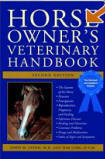|
Equine Kingdom Riding Academy
is no longer in operation. These more than 2,000 unique pages are provided for historical and educational reference. |
||
|
|
||
|
|
November Horse History |
|
1 - On November 1, 1947, the famous racehorse, Man o' War, died. His funeral was attended by over 2,500 people. Man o' War was so famous that, while a stud in retirement, his guest book listed over 2,000,000 names!. 2 - November 2, 1968--John Nerud-trained Dr. Fager, carrying 139 pounds, won the last race of his career, the seven-furlong Vosburgh Handicap at Aqueduct, by six lengths. Dr. Fager was subsequently named champion handicap horse, champion sprinter, turf champion and Horse of the Year. November 2, 1985--Trainer D. Wayne Lukas won his first Breeders' Cup race, the Juvenile Fillies (G1), with Twilight Ridge, whose entrymates Family Style and Arewehavingfunyet finished second and eighth, respectively. November 2, 1991--Dance Smartly won the Breeders' Cup Distaff (G1) and passed Lady's Secret as racing's then all-time leading female Thoroughbred money-earner, with $3,083,456. November 2, 1991--The Breeders' Cup Pick 7, a wager linking the seven Breeders' Cup races, was inaugurated. Wagering on the Pick 7 alone, excluding wagers made on the individual Breeders' Cup races, was $8,526,985. November 2, 2001--The National Thoroughbred Racing Association and Breeders' Cup Ltd. announced that the October 27 Breeders' Cup World Thoroughbred Championships, held at Belmont Park, raised approximately $2.5 million for the NTRA Charities-New York Heroes Fund. In total, more than $5 million was been raised by the international horseracing community for the Heroes Fund, created to aid the families of the victims of the Sept. 11 terrorist attacks. Total contributions by the horseracing community to all Sept. 11-related funds exceeded $10 million. 3 - On November 3, 1934 , the first race track in California opened under a new parimutuel betting law. Bay Meadows, in San Mateo, is still a favorite of pony players in the Bay Area. 4 - 1927: Bateau was disqualified from her third-place finish in the Pimlico Futurity after her jockey, Earl Sande, used the filly to ram the future Kentucky Derby winner, Reigh Count, into the rail. Sande subsequently was suspended for his action. 1998: Michael Rowland became the 88th rider in North America to reach 3,000 career wins when he piloted Bells Gladiator to victory at Thistledown. 2000: Total wagering on the 10-race Breeders' Cup Day program at Churchill Downs was a record $108,598,136. 5 1988: Miesque became the first horse to win two consecutive Breeders' Cup Championship races when she won the Breeders' Cup Mile at Churchill Downs.1988: Julie Krone became the first female jockey to compete in the Breeders' Cup when she rode Darby Shuffle to a second-place finish in the Juvenile Fillies race. 6 1946: Three fillies from Argentina arrived at Newark Airport, having made a journey of 8,250 miles, the then-longest flight ever for horses.1973: Secretariat was paraded before 33,000 fans at Aqueduct, as his final appearance at a racetrack before retirement to stud at Claiborne Farm. 7 1998: Skip Away finished sixth to Awesome Again in the BreedersÂ’ Cup Classic and was denied the title of racing's all-time leading money earner. Skip Away was retired after the race with earnings of $9,616,360, second to Cigar, whose earnings total $9,999,815.1998: Jockey Richard Migliore gained his 3,000th career victory, winning aboard BelleÂ’s Appeal in the second race at Aqueduct. 8 1997: Favorite Trick won the Breeder's Cup Juvenile, concluding an 8-for-8 two-year-old campaign. Favorite Trick would later be voted 1997 Horse of the Year.2000: The New York Racing Association announced that it would begin using the color-coded saddlecloths adopted by many other racetracks around the country. 9 - Today in 1891, the famous Little Big-Horn survivor, Comanche, died at age 29.1957: Wheatley StableÂ’s Bold Ruler, with Eddie Arcaro aboard, won the Trenton Handicap in a wire-to-wire victory over Gallant Man and Round Table in a three-horse race. Bold Ruler was subsequently named Horse of the Year off this performance. 1988: Laffit Pincay Jr. became the second jockey in history to win 7,000 races when he won the seventh race at Hollywood Park aboard Phone Bid. 10 1978: Jockey Patrick Valenzuela won his first career race, aboard Parker Petite, at Sunland Park, New Mexico. 11 1973: Secretariat was flown to Claiborne Farm to begin his stud career.1978: At age four, 1977 Triple Crown winner Seattle Slew won his last race, the Stuyvesant Handicap at Aqueduct Racetrack, by 3 1-4 lengths. 12 1999: Alfred Gwynne Vanderbilt, a driving force behind American racing, died in Mill Neck, N.Y., at age 87. 13 14 1832 - The first horsecar (a streetcar drawn by horses) was displayed in New York City. The vehicle had room for 30 people in three compartments. The new service traveled Fourth Avenue between Prince and Fourteenth Streets.1997: Jockey Eddie Arcaro, a 1958 Racing Hall of Fame inductee and the only two-time winner of the Triple Crown, died of cancer at his home in Miami at age 81. 15 1990: Alydar, one of the top sires in America and runner-up in all three Triple Crown races to Affirmed, was euthanized at Calumet Farm.1995: Jockey Julie Krone rode her 3,000th career winner, in the fourth race at Aqueduct, aboard Dustin's Dreamer. 16 - 1967 - Retired harness racehorse Native Dancer died after stomach surgery in Philadelphia. 1951: The Pimlico Special, then a winner-take-all $15,000 contest, became the first race to be televised nationally. The winner was C.T. Chenery's Bryan G. 17 - 2000: Officials of Breeders' Cup Limited announced the addition of an interactive stallion nomination system to the company's Website. 18 1961: Jockey Eddie Arcaro rode his last career race, finishing third on Endymion in the Pimlico Futurity. He retired with a then-record $30,039,543 in purses.1972: Secretariat capped his two-year-old racing season with a 3 1-2 length victory in the Garden State Stakes at Garden State Park. The winner's share of the purse was $179,199, the most Secretariat ever won in a single race. 1979: In the eighth race at Aqueduct, Laffit Pincay Jr. had his 4,000th career win, aboard Gladiolus. 19 1956: Jockey Fernando Toro won his first career race at the Hipodromo in Santiago, Chile.1995: Jockey Russell Baze became the first rider to have won 400 races a year for four consecutive years, after he rode Royal Boutique to victory at Golden Gate Fields. 20 21 birthday 1949 - Barbara Jo Rubin (horse-racing jockey: 1st U.S. woman to win a flat race against male jockeys [1969]; 1st woman to ride in NY & NJ)1971: Secretariat completed his preliminary training at Meadow training center. 22 1990: Jockey Pat Day marked his 5,000th career winner when he rode Screen Prospect to victory in the Falls City Handicap at Churchill Downs. Day was the twelfth rider in history to hit 5,000. 23 1835 - The horseshoe manufacturing machine was patented by Henry Burden of Troy, New York. 24 25 1997: Officials from Churchill Downs and the Maryland Jockey Club announced a new method for drawing post positions for the Kentucky Derby and the Preakness Stakes. The traditional blind draw would be held to establish a selection order, then a horse's owner/trainer or authorized agent would choose his preferred post position among those still available. 26 1946: American Air Lines transported six horses from Shannon Airport, Eire, Ireland, to Newark, N.J., completing the first trans-Atlantic flight for Thoroughbreds. The plane arrived in the U.S. on Nov. 27.1992: Sandy Hawley became the ninth North American rider to win 6,000 races. His record victory came aboard Summer Commander in the second race at Greenwood Racecourse. 2001: "Seabiscuit," Laura Hillenbrand's best-selling book about the rags-to-riches story of a 1930s Thoroughbred champion and the colorful people associated with him, was honored with the United Kingdom's prestigious "William Hill Sports Book of the Year" award. 27 1951 - The first black horse-racing jockey was licensed in Florida. He was Hosea Richardson and was sixteen years old at the time. 28 - 1982: The brilliant Landaluce, who won her five lifetime starts by a total of 46 1/2 lengths, died of a viral infection. She was buried in the infield at Hollywood Park, where she had won her first two races. Trained by D. Wayne Lukas, Landaluce was later voted champion two-year-old filly of 1982 over another undefeated filly, Princess Rooney. 29 30 1989: Jockey Kent Desormeaux surpassed Chris McCarron's 15-year record for most number of victories in a single season when he rode his 547th winner for the year, at Laurel.1997: Jockey Edgar Prado became the fourth jockey in history to ride 500 winners in a single year. 2001: Advertising on jockeys' attire, owners' silks, and track saddlecloths became legal at California tracks. |




